GB: What does that mean as far as what kind of games you create?
MP: It means that we will continue to look to move the medium. We want to make it more free, which means we want to keep moving the consumer value proposition. Every new generation of games we bring out, you should feel like we just gave you something even more valuable for free. We want to make it more accessible, both in terms of the technology, the user interface, the kind of content. And we want to make it more social. There’s a huge amount of innovation that we do behind the scenes on social. We’ve invented things like ASN, which is a metric that we measure, your Active Social Network. In all of our games we look at how our features and content move your ASN.
For a given new piece of gameplay or a whole new game, or the ergonomics around it, we have a social lobby, our Zynga Social Center. How good a job did we do in reducing the friction in you connecting with other people you care about? And creating more feedback loops. ASN is measuring the number of feedback loops that you have a week in our games. We invented a metric that let our game designers design against social in a way that was measurable. To move that third one, ever more social. I said all this in the online IPO roadshow, I said our strategy. We want to go into every category or genre of play that we think our audience is going to be interested in, and make it more free, accessible and social.
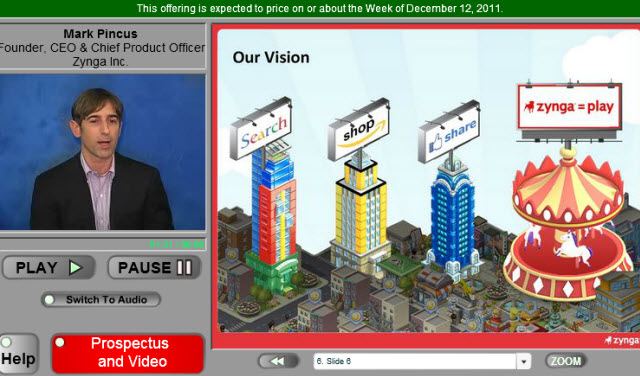 GB: You went on an IPO road show. What was your reaction to it? The part that must be a little frustrating is you communicated a lot of this to everybody, but the stock didn’t pop like it was supposed to in IPOs.
GB: You went on an IPO road show. What was your reaction to it? The part that must be a little frustrating is you communicated a lot of this to everybody, but the stock didn’t pop like it was supposed to in IPOs.
AI Weekly
The must-read newsletter for AI and Big Data industry written by Khari Johnson, Kyle Wiggers, and Seth Colaner.
Included with VentureBeat Insider and VentureBeat VIP memberships.
MP: One thing we’ve done with this company from the beginning is question every assumption. We haven’t always been applauded for questioning all those assumptions, we haven’t always been right in questioning all those assumptions. But we continue to challenge every assumption. One of those assumptions was the whole point of the IPO. We were not going to define the success of our company by a pop in our stock. We wanted to have an efficient trading market in our stock. We had an offering that was many times the size of other IPOs and offerings. I’ve looked at the stock less than six times since we went public. It’s really not something that I spend my time thinking about or worrying about. Again, I think I need to deliver delight for customers, then employees, then shareholders. I think I need to deliver against our mission. We need to innovate to bring play to the world and I’m confident that if we do that, there’ll be a big business and that will probably be more valued in the world.
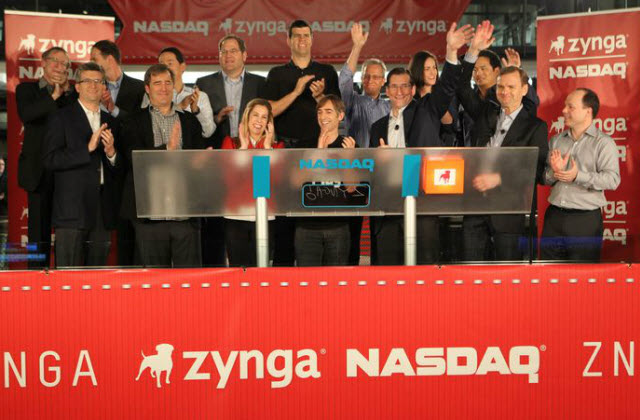 GB: There were some things that the analysts brought up. I wondered what your reaction is. They would say, “Zynga is vulnerable because it’s 95 percent dependent on Facebook,” or “It’s 95 percent dependent on virtual goods.” “If they grow that 5 percent part then we’ll be happier, we’ll feel like there’s less risk in this thing.” From your view, how would you react to some of that?
GB: There were some things that the analysts brought up. I wondered what your reaction is. They would say, “Zynga is vulnerable because it’s 95 percent dependent on Facebook,” or “It’s 95 percent dependent on virtual goods.” “If they grow that 5 percent part then we’ll be happier, we’ll feel like there’s less risk in this thing.” From your view, how would you react to some of that?
MP: Yeah. I think you could have taken that approach and not invested in us a couple of years ago, too. I believe that something bigger is going on. I believe that people are discovering play. I think people have… They’re on Facebook, they’re on iPhones and iPads, they’re hanging out and they want to do something. And I think that they’re discovering that there’s more fun things to do on your iPhone than e-mail. Or SMS. I think we’re seeing that people are voting with their app downloads, that games are the biggest activity that they can engage in on their mobile device. It’s by far the biggest app install on Facebook or any other social network. I think the bigger thing for us to focus on, to worry about, is delivering on the promise of play. Delivering on the promise of free, accessible, and social. And growing that audience. I don’t look at Facebook as a risk, I look at Facebook as an accelerator. I think Facebook has been a wonderful and amazing accelerator of bringing play to the mass market. Just like iPhone has been, and Android. I suppose that if it were a different time and if 95 percent of our business was on the iPhone, then people could say to us, they’re worried that we’re so dependent on the iPhone.
GB: And you’d also wind up like SGN, sold to MindJolt for 30 million bucks or so.
MP: Well, it depends, I guess, on how big the business is that you built on top of that platform. I don’t know if SGN sold for a low price because they were so dependent on iPhone.
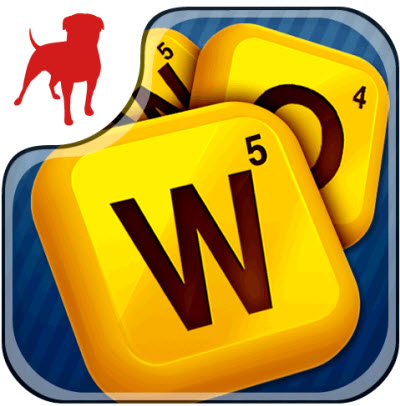 GB: There’s an elementary level of second-guessing that comes with being the center of attention.
GB: There’s an elementary level of second-guessing that comes with being the center of attention.
MP: On our roadshow, I met a lot of really smart people. I was impressed with the questions and the sophistication. They encouraged us, they asked questions that encouraged us to think more broadly about free-to-play gaming than we had. Think more broadly about international markets than we had. There were a lot of provocative investor questions that I feel like I learned a lot from. I also learned how to talk in shorter sentences, soundbites. [laughter]
GB: There were things like… “If only Zynga did this,” it would be more interesting. If only you had more advertising revenue. Or if only you could double the number of people who pay for something in your games. What do you think of those comments as well?
MP: I think that investors like to find the upside in the story. I think that we do have low advertising revenues, compared to the amount of minutes and engagement that we have on our network. It hasn’t been much of a focus until recently. We do have considerably lower buyer penetration than we’ve seen in Asian markets. So investors saw those as upsides in the whole story on monetization.
GB: If you look at the whole industry, what is a thought that you’d have for 2012? If there was a history of things that happened since 2007 here, what do you see the year of 2012 being like?
MP: My prediction is that by the end of 2012, everybody is going to consider themselves in the business of play.
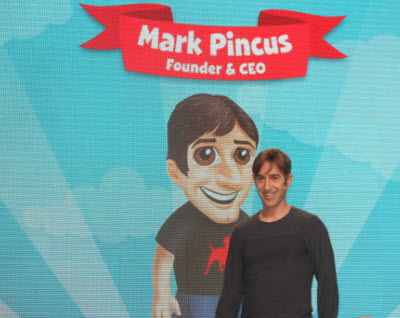 GB: Meaning more gamification happening? Or other things?
GB: Meaning more gamification happening? Or other things?
MP: Well, when I say “play” I mean… I think the idea that the biggest opportunity in gaming going forward, wherever you are in gaming, whether it’s… Maybe this is already obvious, so maybe it’s less of a prediction, but whether it’s console, MMO, mobile, social, I just think by then that almost all gaming will be defined as “social.” I think the idea of single-player gaming… And I think even more so at the consumer level. I think because so many consumers are engaging in gaming, I think that by the end of the year we may not even say “social gaming” anymore. It may be redundant. That’s what I mean by “play.” But maybe you can tell me that’s not even much of a prediction. Maybe we’re already there.
GB: I don’t know if you think this matters, but do you feel like a gaming insider or a gaming outsider?
MP: I’d say that I’m an outsider to the traditional gaming industry. I think I’m an insider to the new industry of play. What do you think?
GB: That sounds good. Maybe it is why you were able to attract some of your key people?
MP: Well, I have so much respect for the gaming industry. And we have so many amazing game-makers here at Zynga, people who have designed some of my favorite games of all time. Like Brian Reynolds, who made Rise of Nations. I’d say that I’m a “blue ocean, not a red ocean” person. I think that strong competition grows an industry. Smart competitors innovate and grow an industry. I also think that by the end of the year, if it’s a successful 2012 for the industry, I think that you’re going to see the EAs and Zyngas and small game developers way more arm-in-arm and shoulder-to-shoulder, working together on standards that drive what we all need to grow this industry, raise all boats.
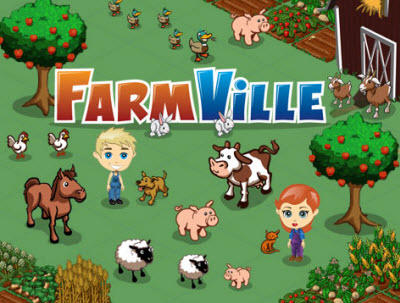 GB: So it would be a red ocean if you were in a death battle with EA.
GB: So it would be a red ocean if you were in a death battle with EA.
MP: It’s a red ocean when you’re fighting each other for market share. It’s a blue ocean when each new product and innovation grows the overall audience. I believe that each new game we’ve brought to market has grown the market for play. I don’t believe that FarmVille took users from anybody. I believe that FarmVille created new users for the industry, new players. And I think that with every successful game that we’ve brought to market, I think we’ve increased the size of the industry for everyone. I think that our competitors, when they brought successful games to market, have done the same thing. That’s why I keep coming from this place of… How do we as an industry get to a billion people playing together? How do we create a robust business around virtual goods, in-out purchase, and engagement-based advertising? That’s the dialogue we should all be having with each other. It’s way more productive for the end players and it’s more productive for us as an industry.
VentureBeat's mission is to be a digital town square for technical decision-makers to gain knowledge about transformative enterprise technology and transact. Learn More